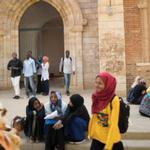Rubble Investments: the blocked, broken, and redirected flows of capital from Sudan
Being removed from one’s homeland may for some be experienced as existing in a state of rubble, especially as displacement grows protracted. While the immediate outbreak of war in Sudan in April of 2023 was characterized by the deeply human impulse to seek protection, which for many meant fleeing, the time after is not something one prepares for. The shifting timelines of the displaced Sudanese in Egypt are an example of this, and we see the business strategies of Sudanese as an example of learning to live after the end (of their hope for rapid return). It is here that we situate our discussion of rubble investments.
The use of the metaphor is to indicate that while the Sudanese have experienced destruction, there is rubble remaining which can be utilized, and here we think of this rubble in the forms of economic, social and cultural capital.
Setting out the various businesses of displaced Sudanese men in Cairo, we highlight the centrality and existential importance of trust based transactional networks, both local and global. Based on fieldwork in Cairo the authors further set out a critical discussion of how capital(s) are used to give maneuvering space, but also to restrict and police the Sudanese community.
The paper was presented as part of a SNAC organized panel on Sudanese displacement: capital, identity and agency organized by Munzoul Assal and Mari Norbakk








